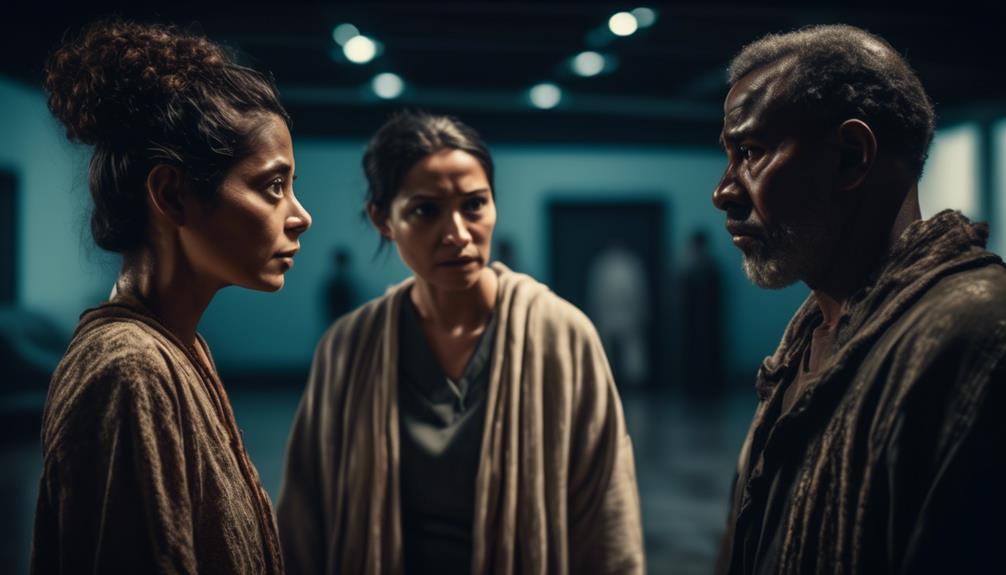When to Seek Help for Cultural Conflicts in Relationships

It's time to seek help for cultural conflicts in relationships when you feel like you're constantly walking on eggshells and avoiding addressing the clashes. These conflicts can fester and potentially destroy your relationship if left unaddressed.
Recognizing the Signs of Cultural Conflicts
To navigate cultural conflicts in relationships, it's crucial to recognize the signs that indicate these clashes. Communication barriers and cultural sensitivity play a significant role in identifying these signs.
When you find it difficult to express your thoughts and feelings clearly to your partner, or when there's a constant misunderstanding due to language differences, it's a sign of a communication barrier. These barriers can create frustration and resentment, leading to conflicts in your relationship.
Cultural sensitivity is another important aspect to consider. If you or your partner consistently disregard or belittle each other's cultural practices, beliefs, or values, it's a clear indication of a cultural conflict. Ignoring or disrespecting each other's cultures can cause deep-rooted resentment and can lead to a breakdown in trust and communication.
Recognizing these signs is the first step towards resolving cultural conflicts in your relationship. It requires open and honest communication, a willingness to understand and respect each other's differences, and a commitment to finding common ground. By addressing these issues early on, you can prevent them from escalating and damaging your relationship further.
Communication Breakdowns and Misunderstandings
Communication breakdowns and misunderstandings can be detrimental to the health and longevity of a relationship. When cultural differences come into play, these barriers can become even more challenging to overcome. However, fostering understanding and finding ways to bridge the gap is crucial for the success of the relationship.
One way to overcome these barriers is by actively listening to your partner. Take the time to truly understand their perspective, even if it differs from your own. Avoid making assumptions or jumping to conclusions. Instead, ask questions and seek clarification to ensure that you accurately understand their thoughts and feelings.
Another effective strategy is to practice empathy. Put yourself in your partner's shoes and try to see things from their point of view. This can help you develop a deeper understanding of their cultural background and the values that inform their actions.
Furthermore, it's essential to establish open and honest communication channels. Encourage your partner to express their thoughts and emotions freely, without fear of judgment or criticism. Likewise, be receptive to their feedback and be willing to make adjustments or compromises when necessary.
Impact on Emotional Well-Being and Mental Health
The impact of cultural conflicts on your emotional well-being and mental health can be profound and far-reaching. It's important to recognize that when cultural conflicts arise in relationships, they can have serious consequences on your overall mental well-being.
Here are some of the ways in which cultural conflicts can impact your emotional well-being and mental health:
- Increased stress and anxiety: Cultural conflicts can result in heightened levels of stress and anxiety, as you may find yourself constantly navigating unfamiliar cultural norms and expectations. This constant pressure can take a toll on your mental health and leave you feeling overwhelmed.
- Feelings of isolation and loneliness: Cultural conflicts can create a sense of isolation and loneliness within a relationship. When you and your partner have different cultural backgrounds, it can be challenging to find common ground and feel understood. This can lead to feelings of loneliness and a sense of disconnect within the relationship.
- Negative impact on self-esteem: Cultural conflicts can also have a negative impact on your self-esteem. When your cultural beliefs and values clash with those of your partner, it can make you question your own identity and worth. This can result in a decrease in self-esteem and overall well-being.
It is crucial to address and seek help for cultural conflicts in relationships to ensure your emotional well-being and mental health are protected.
Persistent Unresolved Conflicts
When cultural conflicts persist in relationships, they can have a detrimental impact on the emotional well-being and mental health of those involved. Persistent unresolved conflicts can create a toxic environment, causing stress, anxiety, and even depression. It's important to recognize when these conflicts aren't being effectively resolved and seek professional intervention.
Dealing with cultural conflicts requires cultural sensitivity. It's essential to understand that different cultures have unique values, beliefs, and communication styles. Without cultural sensitivity, conflicts can escalate and become even more challenging to resolve. Professional intervention can provide guidance and support in navigating these conflicts, offering strategies to promote understanding and compromise.
Ignoring persistent unresolved conflicts will only lead to further damage. The longer these conflicts linger, the more damage they can cause to the relationship and the individuals involved. Seeking professional help can help break the cycle and provide a safe space to address these conflicts.
Remember that it's okay to ask for help. Seeking professional intervention doesn't mean that you have failed or that your relationship is doomed. It means that you value your emotional well-being and the health of your relationship enough to seek assistance in resolving these conflicts. With the help of a professional, you can gain the tools and insights needed to address cultural conflicts in a productive and healthy manner.
Navigating cultural differences alone can be an overwhelming and isolating experience. The challenges you face in navigating these differences can leave you feeling lost and uncertain about how to proceed. Here are some of the specific challenges you may encounter:
- Miscommunication: Without a shared understanding of cultural norms and communication styles, misunderstandings can easily arise. This can lead to frustration, tension, and even conflict in your relationships.
- Conflicting Values: Cultural differences often come with differing values and beliefs. Navigating these differences alone can be challenging, as you may find yourself questioning your own values and struggling to find common ground with your partner or loved ones.
To add another level of sophistication to this discussion, it's important to consider the sub-lists within these challenges:
- Language Barriers: When trying to navigate cultural differences alone, language barriers can present a significant challenge. Limited language proficiency can make it difficult to express your thoughts and emotions accurately, leading to further misunderstandings.
- Loneliness and Isolation: Navigating cultural differences alone can make you feel isolated and lonely. Without a support system or someone who understands your perspective, it can be challenging to navigate the complexities of cultural differences.
Seeking Professional Guidance and Expertise
Feeling overwhelmed and uncertain about how to navigate cultural differences alone? Seek professional guidance and expertise to find the support and guidance you need. When it comes to addressing cultural conflicts in relationships, seeking expert advice can be incredibly beneficial. Professionals who specialize in multicultural counseling and therapy can provide the knowledge, skills, and tools necessary to navigate these complex situations.
One option for seeking professional guidance is through therapy. Therapy provides a safe and confidential space where you can explore your feelings, thoughts, and experiences related to cultural conflicts. A therapist can help you gain a deeper understanding of your own cultural background and beliefs, as well as those of your partner. With their expertise, they can guide you in developing effective communication strategies, problem-solving techniques, and coping mechanisms.
There are various therapy options available, such as individual therapy, couples therapy, or group therapy. Individual therapy allows you to focus on your own personal growth and self-reflection, while couples therapy enables you and your partner to work together to address cultural conflicts within your relationship. Group therapy provides the opportunity to connect with others who may be facing similar challenges, offering a supportive and validating environment.
Benefits of Couple's Therapy for Cultural Conflicts
Couple's therapy can be a transformative tool for addressing and resolving cultural conflicts in your relationship. When it comes to navigating cultural differences, it's crucial to approach the situation with cultural sensitivity and embrace effective communication techniques.
Here are some benefits of couple's therapy for cultural conflicts:
- Increased cultural sensitivity: Couple's therapy provides a safe space for you and your partner to explore and understand each other's cultural backgrounds. A skilled therapist can help you develop a deeper appreciation for each other's customs, traditions, and values, fostering a greater sense of cultural sensitivity within the relationship.
- Enhanced effective communication: Cultural conflicts often arise due to miscommunication or misunderstandings. Couple's therapy can teach you and your partner effective communication strategies to bridge the gap between your cultural differences. You'll learn how to express your needs and concerns in a way that's respectful and considerate of each other's cultural backgrounds.
- Improved conflict resolution skills: Cultural conflicts can be emotionally charged and complex. Couple's therapy equips you with the necessary tools to navigate these conflicts in a healthy and constructive manner. You'll learn how to manage conflicts without resorting to harmful stereotypes or assumptions, fostering a more harmonious and inclusive relationship.
Strengthening Your Relationship Through Outside Help
To truly fortify your relationship, seeking outside assistance can be a game-changing move. When cultural conflicts arise, it's important to recognize that you don't have to face them alone. Relationship counseling and multicultural support groups can provide the guidance and support you need to navigate these challenges together.
Relationship counseling offers a safe and neutral space where you and your partner can openly discuss your cultural differences and the conflicts they may cause. A trained therapist can help you understand each other's perspectives, improve communication, and find solutions that work for both of you. They can also provide valuable tools and strategies to promote understanding and compromise.
Multicultural support groups can be another valuable resource for strengthening your relationship. These groups bring together individuals and couples who are navigating similar challenges. By sharing experiences, insights, and strategies, you can gain a sense of validation and learn from others who've faced similar cultural conflicts. It can be incredibly empowering and reassuring to know that you aren't alone in your journey.
Seeking outside help isn't a sign of weakness, but rather a proactive step towards building a stronger relationship. Don't let cultural conflicts erode your connection. Reach out for support and let professionals and fellow couples guide you towards a more harmonious and fulfilling relationship.
Frequently Asked Questions
How Can Cultural Conflicts Impact Other Areas of a Relationship Beyond Just Communication?
Cultural conflicts go beyond communication, impacting emotional well-being in a relationship. To manage them, seek help when these conflicts affect your happiness and connection. Strategies can be learned to navigate these challenges together.
Are There Any Long-Term Effects on Mental Health if Cultural Conflicts Are Left Unresolved?
Leaving cultural conflicts unresolved can have long-term consequences on your mental health. It can impact your overall well-being, leading to increased stress, anxiety, and even depression. Seeking help is crucial for your emotional and psychological health.
Navigating cultural differences alone can be challenging. You may face misunderstandings, miscommunications, and conflicting values. Seeking help can provide strategies for resolution, alleviating stress and promoting understanding in your relationship.
How Can Seeking Professional Guidance and Expertise Help in Resolving Cultural Conflicts in Relationships?
When seeking help for cultural conflicts in relationships, professional guidance can provide expertise and support to resolve issues. They offer insights and strategies that may not be easily accessible on your own, leading to healthier and more harmonious relationships.
Can Couple's Therapy Be Effective in Strengthening a Relationship That Is Experiencing Cultural Conflicts?
Couple's therapy can be effective in strengthening relationships experiencing cultural conflicts. It provides a safe space for open communication, understanding, and finding common ground. Seek help when cultural differences strain your relationship.











